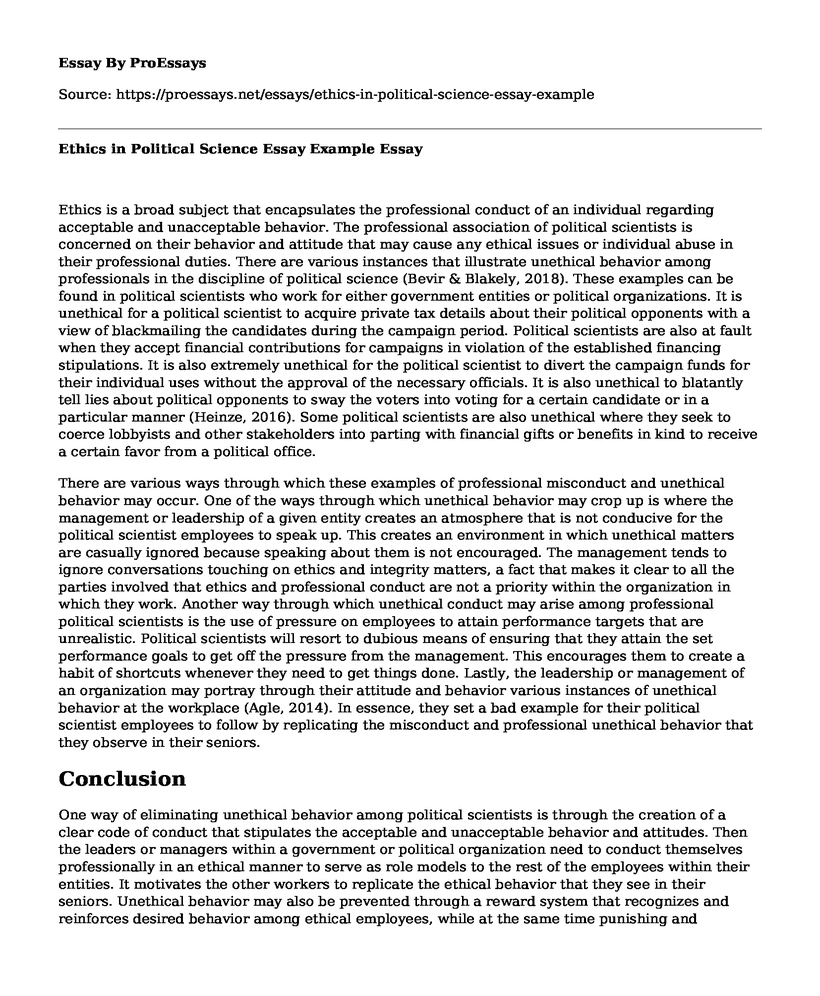Ethics is a broad subject that encapsulates the professional conduct of an individual regarding acceptable and unacceptable behavior. The professional association of political scientists is concerned on their behavior and attitude that may cause any ethical issues or individual abuse in their professional duties. There are various instances that illustrate unethical behavior among professionals in the discipline of political science (Bevir & Blakely, 2018). These examples can be found in political scientists who work for either government entities or political organizations. It is unethical for a political scientist to acquire private tax details about their political opponents with a view of blackmailing the candidates during the campaign period. Political scientists are also at fault when they accept financial contributions for campaigns in violation of the established financing stipulations. It is also extremely unethical for the political scientist to divert the campaign funds for their individual uses without the approval of the necessary officials. It is also unethical to blatantly tell lies about political opponents to sway the voters into voting for a certain candidate or in a particular manner (Heinze, 2016). Some political scientists are also unethical where they seek to coerce lobbyists and other stakeholders into parting with financial gifts or benefits in kind to receive a certain favor from a political office.
There are various ways through which these examples of professional misconduct and unethical behavior may occur. One of the ways through which unethical behavior may crop up is where the management or leadership of a given entity creates an atmosphere that is not conducive for the political scientist employees to speak up. This creates an environment in which unethical matters are casually ignored because speaking about them is not encouraged. The management tends to ignore conversations touching on ethics and integrity matters, a fact that makes it clear to all the parties involved that ethics and professional conduct are not a priority within the organization in which they work. Another way through which unethical conduct may arise among professional political scientists is the use of pressure on employees to attain performance targets that are unrealistic. Political scientists will resort to dubious means of ensuring that they attain the set performance goals to get off the pressure from the management. This encourages them to create a habit of shortcuts whenever they need to get things done. Lastly, the leadership or management of an organization may portray through their attitude and behavior various instances of unethical behavior at the workplace (Agle, 2014). In essence, they set a bad example for their political scientist employees to follow by replicating the misconduct and professional unethical behavior that they observe in their seniors.
Conclusion
One way of eliminating unethical behavior among political scientists is through the creation of a clear code of conduct that stipulates the acceptable and unacceptable behavior and attitudes. Then the leaders or managers within a government or political organization need to conduct themselves professionally in an ethical manner to serve as role models to the rest of the employees within their entities. It motivates the other workers to replicate the ethical behavior that they see in their seniors. Unethical behavior may also be prevented through a reward system that recognizes and reinforces desired behavior among ethical employees, while at the same time punishing and discouraging unethical behavior among the political scientists. The management should also provide the tools, feedback, and environment that supports ethical behaviors and attitudes at the workplace for all the political scientists to follow (Desposato, 2015). The implementation of these measures will go a long way in getting rid of the undesired unethical and unprofessional conduct.
References
Agle, B. R. (2014). Research companion to ethical behavior in organizations: Constructs and measures. Cheltenham: Elgar.
Bevir, M. & Blakely, J. (2018). Why political science is an ethical issue. Political Studies, Vol 66, Issue 2. doi: 10.1177/0032321717723503
Blank, R. H. (2016). Intervention in the brain: Waste, material cultures, social justice. Cambridge: MIT Press.
Desposato, S. (2015). Ethics and experiments: Problems and solutions for social scientists and policy professionals. Routledge.
Heinze, E. A. (2016). Global violence: Ethical and political issues. Routledge.
Cite this page
Ethics in Political Science Essay Example. (2022, Jul 08). Retrieved from https://proessays.net/essays/ethics-in-political-science-essay-example
If you are the original author of this essay and no longer wish to have it published on the ProEssays website, please click below to request its removal:
- History of US Law Enforcement Essay
- Paper Example on Constitutional Powers of the Presidency
- State of Consciousness Essay Example
- Marxism and Neoliberalism Description of Capitalism Essay
- Business Ethics Reflection Essay Example
- Essay Sample on Exploring the Impact of US Federal Immigration Policies on Local Governments
- Essay Example on Nietzsche's Critique of Morality: Analysis of Its Impact on Humanity







